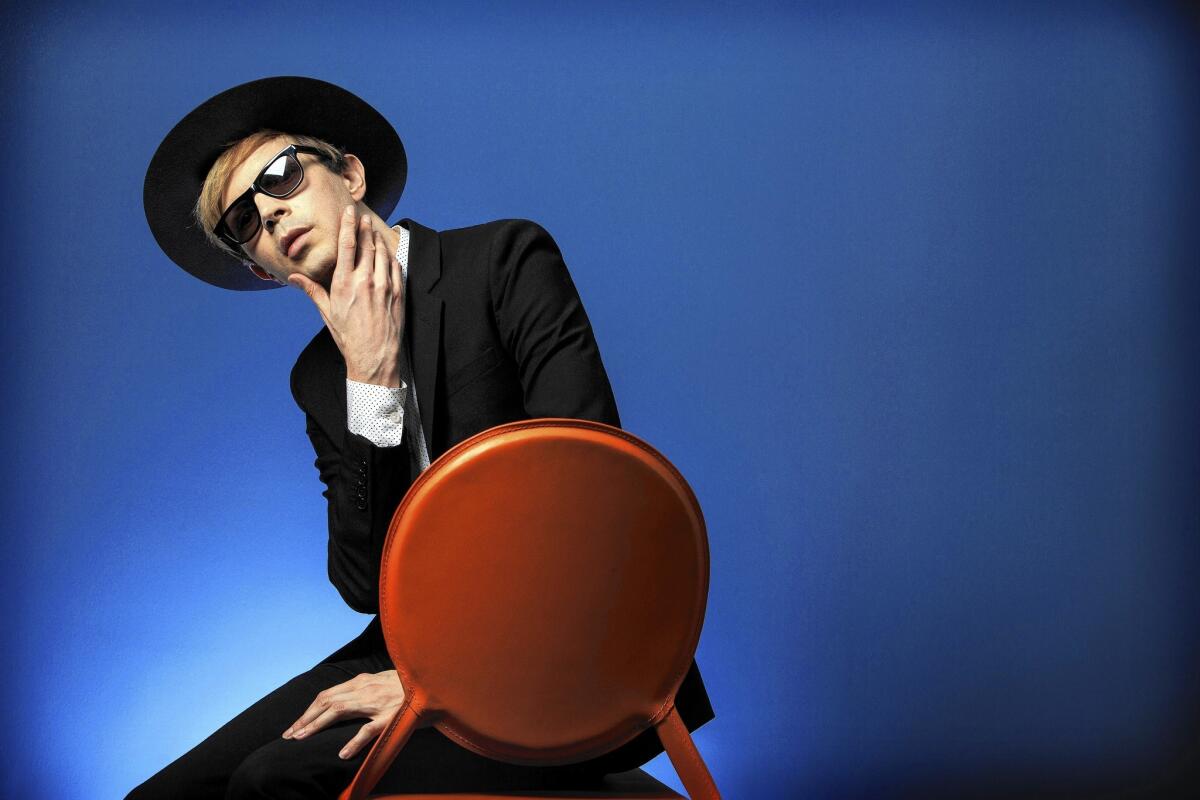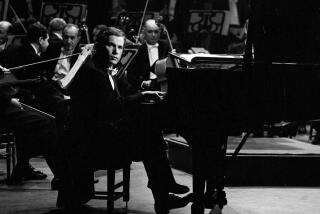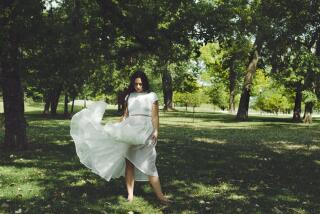Beck seeks the ‘most essential, elemental sounds’ in ‘Morning Phase’

By the time that Beck Hansen finished his lush, melancholy new record, “Morning Phase,” he had become so consumed by the process that he says he’d caused brain damage.
“I’ve heard each song about six or seven thousand times, to the point where it’s burned a hole, neurologically, in my auditory system,” the 43-year-old songwriter, whose work over the last two decades has helped define modern Los Angeles with his expansive, all-consuming eardrums, said over dinner recently in Los Feliz.
Recorded in Nashville, Paris, London and Los Angeles over seven intense months, “Morning Phase” is the artist’s 12th album and first studio album since he hit 40, and it sounds it.
INTERACTIVE: Discover songs of L.A.
Pensive, smooth, filled with rich Southern California harmonies by way of the Beach Boys, Tim Buckley and various ladies and men of the canyon and nary an abrasive note, it’s a record that a successful adult man with a wife and two kids, like Beck, would make. It’s also one in a line of records that he’s crafted, the best known of which is the West Coast cool-rock classic “Sea Change” from 2002, that rein in his beat-based, oft-funky/funny electronic jamz in favor of more traditionally arranged American music.
He suggested dinner at the same Italian restaurant where 20 years prior the then-prodigy with a pre-viral viral hit “Loser” first met with executives from a high-flying Geffen Records. Beck is as lithe as he was then, with a tight haircut longer on top than the sides and a kind, barely guarded demeanor eager to place his ambitious new record in a context.
Since that meal (the menu hasn’t changed much, he says) in one of the many neighborhoods he’s occupied over the years, he went platinum with his major label debut, “Mellow Gold,” which turns 20 this spring. He followed that with, among others, the critical breakthrough “Odelay,” the odd experiment in funk with “Midnite Vultures,” broke up with a longtime girlfriend, made “Sea Change,” quietly acknowledged an affiliation with Scientology stretching back to his youth, expanded into bleepy electronics with “Guero” and “The Information,” married actress Marissa Ribisi and had kids and tried to reconcile the lot of it on “Modern Guilt.”
“I spent the last few records trying to develop, or create some sort of continuity with, earlier records like ‘Odelay’ and ‘Mellow Gold,’” he says. “I purposefully wanted to have songs that worked with those live. ‘People like those other records? Well, maybe they’ll like this.’ So I’ve tried to cultivate that, but I wouldn’t say that that was my natural instinct.”
After working at reconciling his many aesthetic interests — and becoming a free agent upon concluding a long business relationship with Geffen and owner Universal — Beck said that “Morning Phase” was a stab at purging his songs of everything but “the most essential, elemental sounds.”
“I think we can all accept that acoustic guitar, and a piano, and an upright bass and acoustic drum and strings — they’re things that are elemental. I felt like for the songs to have a kind of particular quality, something that feels like it breathes or has a warmth to it, that those would be the most suited.” Beck would offer a bare rendition, often on guitar, that the band would then manifest and augment.
GRAPHIC: Times music staff best of 2013
Add in a touch of banjo, pedal steel, oceans of string arrangements by his father, David Campbell, a languid (his critics would say “glum”) voice, on many songs multi-tracked to sound like dozens of Becks harmonizing, and the result is one slow drift of melodies and arrangements that morph and chime over the course of the album.
You can also hear the foundational echo of rural blues, which the artist internalized during a bout of musical obsession in the late 1980s. This devotion to blues themes has fed some of his best work, and “Morning Phase” often feels like an effort to stare at this darkness until a speck of light appears.
A long dawning
The seeds of “Morning Phase” were planted in summer 2012, recalls longtime bassist Justin Meldal-Johnsen. “Beck had these songs, and he’s like, it’s time to record what he referred to as a quote-unquote acoustic record because he just had no other definition for it.”
Thematically linked around the notion of daybreak but with songs that occur through days and nights — in cars roaming late-night boulevards in “Unforgiven,” of “sleet that rests upon the quiet street we’re standing on,” during a breakup on “Say Goodbye,” of “a turncoat on his knees, a vagabond that no one sees” in “Blue Moon” — it’s an album that dwells on loneliness, isolation and “the damage done, somewhere unforgiven.”
Nestled within are tiny pearls of hope. For “Wave,” Beck strips all instrumentation save a roomful of strings to present a song about the wonder and violence of birth: “I move away from this place in the form of a disturbance,” he sings. “And enter into the world like some tiny distortion.”
“On this record we had a lot of fun being responsive to the songs in a way that was minimal beyond anything we had done before, and slowing things down to create this weight,” says Meldal-Johnsen. “We just wanted to create this cavernous, very dramatic sense of space and the heaviness of the groove.”
The reflex seems to have been on target. “Morning Phase” is receiving some of the best reviews of Beck’s career. In a New Yorker rave, Sasha Frere-Jones wrote that “After listening to ‘Morning Phase’ almost 50 times, I can’t find a single thing wrong with it.”
Beck is wary of such quick reactions, a product of an era in which seven months of work will be received by listeners with endless queues already stacked with next week’s buzz band.
Unless you get a radio hit, absorbing music is often an exercise in patience, he says, and seldom deserving of quick-react praise or dismissal. “It takes a number of years, really, for people to become used to certain songs,” he says. “It has to sit with people for a while. I have the same thing. Artists whose music I like, it takes a few years sometimes to have that kind of happy recognition, ‘Oh, this song!’”
The record reunites Beck’s most enduring set of players, the same unit that recorded “Sea Change,” “Mutations” and “Midnite Vultures” — Meldal-Johnsen, guitarist Smokey Hormel, keyboard player Roger Joseph Manning Jr. and drummer Joey Waronker. Also featured is the work of bassist Stanley Clarke, guitarist Jason Falkner and harpist Stephanie Bennett.
Beck had been waiting to work on the music that became “Morning Phase” for years but was sidelined by other endeavors and pressing concerns: family, a back injury and a series of music projects that proved that the half-decade between albums wasn’t time wasted but spent maintaining a creative groove while healing and easing into a more settled life.
In that period, he recorded and released online a series of cover albums (“The Velvet Underground and Nico,” Skip Spence’s “Oar,” among others), three 12-inch records, a collection of Philip Glass remixes that he curated and contributed to. He produced career-best solo albums by Thurston Moore, Stephen Malkmus & the Jicks and Charlotte Gainsbourg and, most impressive, composed “Song Reader,” a series of new compositions released in conjunction with McSweeney’s and published as a gorgeously designed package of sheet music.
Last fall, Beck and collaborators celebrated “Song Reader” at Walt Disney Concert Hall in a variety-show-style format featuring, among others, Jarvis Cocker, John C. Reilly and friends, Jack Black, Anne Hathaway and Jenny Lewis, Childish Gambino and Merry Clayton. With his father conducting the L.A. Phil, the evening had the feel of a christening, that the former “Loser” of Los Angeles had arrived to become a laureate.
PHOTOS: Unexpected musical collaborations
“Those nights were really, for me, the payoff for the whole project — which I wasn’t anticipating,” he says. “When I was making the book it was about making the book, but I realized later that making the book was an excuse to make these shows happen.”
That he was being celebrated a short distance from where he was born added heft. “That was very much the backdrop of my childhood,” he says. “I was born just west of downtown. Literally three blocks. As a kid I was just walking all up and down downtown.” Near Al’s Bar, one of his early haunts, was “the kind of neighborhood where you knew all the homeless people. Some of them sold jewelry. If you had a car they’d wash your car for you.”
Beck also helped advise visual artist Doug Aitken on his “Station to Station” traveling train happening, which arrived at Union Station in October. Featuring Beck in performance with a skeletal band and a gospel choir, the gig at Union Station was a kind of homecoming for the artist, who recalled “being 15 and being kicked out of there for loitering, because I used to go down there to read a book or walk around. Who would have known?”
A bunch of other projects are in various states of completion. Another long-gestating record, possibly to be released later in 2014 (and possibly featuring Pharrell), has “a lot of surprising convergences.” A tour in support of “Morning Phase” commences in the spring. An unfinished country album starring a character named Randy, who recently appeared in a one-off 45 released on Jack White’s Third Man imprint, is germinating.
It feels like Beck is easing into his 40s with a sense of purpose.
“There’s a real value to momentum, when you’re working and developing a thing, and you’re in that frame of mind for an extended period of time,” he says. “You start to get a little deeper into ideas.”
More to Read
The biggest entertainment stories
Get our big stories about Hollywood, film, television, music, arts, culture and more right in your inbox as soon as they publish.
You may occasionally receive promotional content from the Los Angeles Times.






